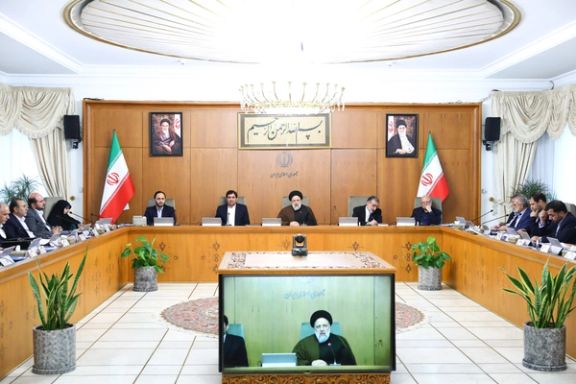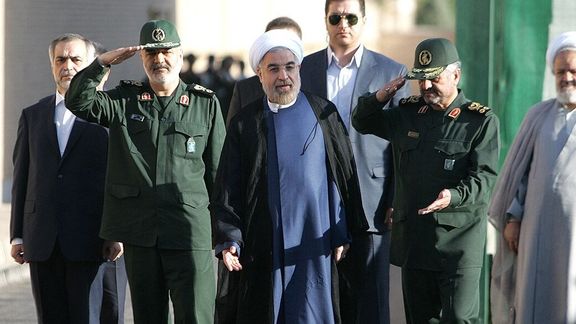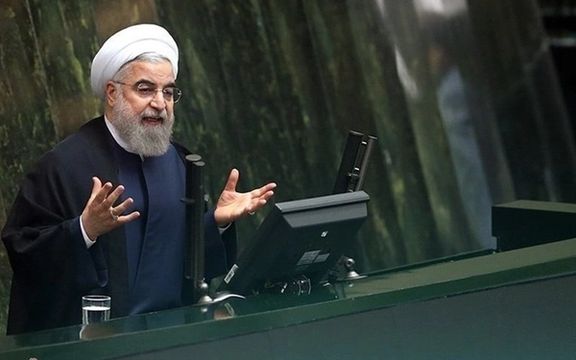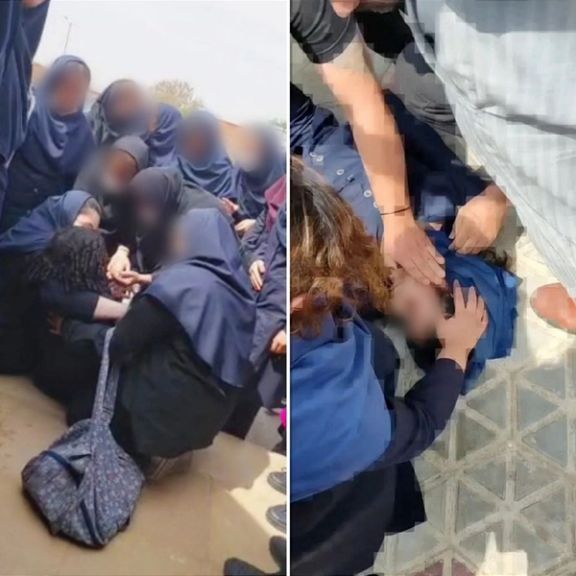Raisi Replaces Budget Chief Amid Economic Woes

After almost one year of demands by lawmakers and commentators, and amid skyrocketing inflation Iranian President Ebrahim Raisi has replaced his budget chief.

After almost one year of demands by lawmakers and commentators, and amid skyrocketing inflation Iranian President Ebrahim Raisi has replaced his budget chief.
Government Spokesman Ali Bahadori Jahromi said Tuesday that the head of the Planning and Budget Organization and the agriculture minister have been replaced.
According to Jahromi, Davoud Manzour who headed the Iranian National Tax Administration has been appointed as caretaker head of the Planning and Budget Organization to replace Masoud Mirkazemi.
“Mirkazmi had requested from the president several times to be replaced due to a heart problem,” claimed Jahromi.
The Central Bank of Iran announced late March that the annual inflation rate stands at 46.5 percent. Although the official inflation rate announced by the authorities is usually less than what it seems in the market, even a 46.5-percent inflation is among the highest in Iran in more than 30 years.
The government spokesman also said during his press conference that Mohammad Aghamiri, Head of the Iran Veterinary Organization has replaced Javad Sadatinejad as the acting agriculture minister.
Earlier this month, Iran’s Minister of Education Yousef Nouri resigned amid widespread discontent at a delay in the payment of salaries for teachers.
President Raisi accepted Nouri’s resignation and appointed Reza Morad Sahraee, the current president of Farhangian University, as the caretaker minister.

Despite lack of any evidence, IRGC-affiliated Tasnim news claims that former Iranian president Hassan Rouhani is preparing to run for parliament next March.
The short report Tuesday did not provide any evidence or sources, but said Rouhani convenes his election meetings with aides on weekly basis.
Rouhani or people close to him have not said anything about the elections or his political plans and there are no reports of him having formed an election team.
Iran’s hardliners and the Revolutionary Guard who control the current parliament are opposed to Rouhani or any other politician who in Iran’s political context can be described as centrist or reformist.
Tasnim makes that clear, repeating harsh criticism routinely voiced by hardliners that the country’s current economic crisis is the fault of the Rouhani administration, which they say counted on good relations with West and lifting of sanctions instead of presumably focusing on indigenous efforts to boost production.

However, since Rouhani left office in mid-2021, the hardliners who took over both the presidency and the parliament have made matters much worse.
Iran’s currency has halved in value since August 2021 and inflation has soured above an annual 40-percent rate.
The current members of parliament have very little to show after three years into their term and given months of anti-regime protests they are very nervous about their re-election according to commentators who write in Tehran media.
Last week, news emerged that some lawmakers are entertaining the idea of barring anyone who in the past has served three terms in the legislator from running next year. Already, several politicians and pundits have sharply criticized the possible move, saying that this is only aimed at eliminating competition to the sitting parliament packed with hardliners.
But given the fact that in the 2020 elections most centrists and reformists were barred from running by the Guardian Council controlled by Supreme Leader Ali Khamenei, Rouhani would not risk putting his candidacy forward unless he receives assurances from him that he would not be rejected. He has already said that next elections must be free and fair.
Also, as a former president, Rouhani would run only if he can receive backing by the majority in the new parliament to be crowned Speaker. For that, “He would need to have a sizeable contingent of supporters, which means that Khamenei has to allow non-hardliners also to run and get elected,” political analyst Behrouz Turani told Iran International. He also said, “The report by Tasnim could be a ploy to test Rouhani and see if he will deny any intention to run next year.”
It should also be noted that the Iranian campaigns typically do not start months before an election.
For now, no one knows what the Supreme Leader is thinking. His strategy of handing over both the parliament and the presidency to loyal, ultra-conservative politicians and operatives has backfired.
Not only the economy has sunk deeper into crisis, but the Islamic Republic faces the largest popular opposition in its 44-year history. Even many loyalists express total disappointment with President Ebrahim Raisi and the parliament in the local media.
In the past, Khamenei has played the political game of allowing reformists to win elections to mollify a dissatisfied population, and he might decide to play the same game again, but Rouhani during his presidency has made it clear that he was not happy with Khamenei’s and IRGC’s interference in the affairs of the government.
Moreover, some voices have raised the issue of a constitutional change, meaning to eliminate or restrict outfits that are Khamenei’s tools for interference.
After massive protests and lingering instability, this time the political atmosphere will be different from past elections. Either Khamenei has to double down in supporting the hardliners or has to allow other regime insiders frustrated with him and angry with the IRGC to take over the parliament.

Schools in several cities of Iran witnessed suspicious chemical attacks once again on Tuesday, with poisoned students transferred to medical centers.
This comes as the Ministry of Islamic Guidance has sent a notice to the local media to censor the news related to the attacks.
Several schools in Tabriz, Esfahan, Shahinshahr, Genaveh, Kermanshah, Oshnaviyeh, and Kamyaran have witnessed suspected poisoning attacks on the students.
Eyewitnesses from the central city of Esfahan say "Two ambulances were sent to Shayan girls school, but none of them had oxygen masks and as a result several students lost consciousness."
Some others from Shahinshahr in Esfahan province also say that a school was subjected to a chemical attack but "they [officials] locked the door and did not allow the poisoned students to leave."
In the city of Kamyaran in western Kordestan province, at least 12 female students of a primary school have been transferred to hospital.
Meanwhile, the Hengaw human rights organization reported that several school principals in Baneh, Kordestan have called on the families not to send their children to school "until full security is provided".
More than four months after the suspected poisonings across hundreds of schools, the country is no closer to finding answers.
According to Deputy Health Minister Saeed Karimi, since the poisonings began on November 30, at least 13,000 female students were taken to medical centers due to suspected gas poisoning.

A regime insider and former editor of the conservative flagship Kayhan Daily, has categorically slammed Iran’s support for Russia in the war against Ukraine.
In a debate at Amirkabir University of Tehran, Mehdi Nasiri severely criticized the foreign policy of the Islamic Republic on Sunday, saying that "we supported Putin's disgraceful aggression against a country and gave him weapons".
Despite evidence provided by Ukraine and Western countries, the Iranian officials for months have denied sending drones to Russia.
Finally, last November Foreign Minister Hossein Amir-Abdollahian confirmed the deployment, admitting they were limited in number, and sent before the outbreak of the war in Ukraine.
Ukraine has accused the officials of the Islamic Republic of Iran of "lying" while the European Union and the United States have imposed several rounds of sanctions against the clerical regime for sending drones to be used in the war on Ukraine.
During his debate with pro-regime insider Mehdi Khanalizedh, Nasiri added that "the Islamic Republic has been looking for nuclear weapons" and therefore " the people and economy of Iran suffered billions of dollars of loss."
"We have established an enemy-oriented system and are mainly looking for the creation of enemies. We must go back and make changes, including in foreign policy,” he said.
He further added that like North Korea, the Islamic Republic wants to be “under the nuclear umbrella of Russia", while "this is the worst way", the Russians not trusted on the global stage.

The Islamic Republic's chief banker says strict measures recently introduced on the banking system are aimed at curbing capital flight, claiming they follow international norms.
Mohammad-Reza Farzin, the governor of the Central Bank of Iran (CBI), said on state TV Monday night that "all the countries of the world have regulations to prevent capital flight, and capital flight means that you give rials and receive a foreign currency, and it doesn't matter if you keep this currency at home or, for example, go to Turkey and buy a house with it.”
Farzin avoided issues of transparency, he claimed people can do whatever they want with their money if it is not illegal or considered laundering. To have control over the people’s money, the Islamic Republic has recently announced regulations that push people to open foreign currency accounts in its notoriously corrupt, if not bankrupt banks in Iran instead of getting the foreign currency in cash.
Farzin said pushing people to have long-term foreign currency accounts is a measure to control the currency market, but the owners of these accounts cannot withdraw deposits in the foreign currency and only can get the equivalent in almost worthless rials. On the other hand, Farzin has said that the CBI does not consider the exchange rate to be at the actual rate at which people are buying and selling currencies in the market, and that the government plans to have a cap on the rates. For example, the rate that Farzin had announced for the exchange of dollars is about half of the exchange rate at the market at about 280,000 rials for one dollar, while the current rate is about 510,000 rials.
The cash-strapped regime has been unable to access a large portion of its export revenues due to international sanctions, and has been eying measures to grab money kept by the public in safety deposit boxes or at homes. In April 2022, the country’s Headquarters for Combating Smuggling of Goods and Currency announced that the maximum limit for keeping foreign currencies is $10,000 or its equivalent in other currencies. For any amount more than this limit, people should apply for special permits.

Elsewhere in his remarks, Farzin referred to a suspicious bank heist last year, the biggest in recent history and the shadiest in nature as robbers broke only into safety deposit boxes and were arrested in a matter of days. Farzin said that according to the information obtained from the robbery as well as the data from other safety deposit boxes throughout the country, about $15-16 billion dollars are kept in boxes.
In June 2022, thieves broke into at least 200 to 250 safety deposit boxes in the central Tehran branch of Iran’s largest bank – the state-owned Bank Melli (National Bank). Apparently, the robbers gained access from an adjacent building during a two-day holiday. Four days after the heist, police displayed recovered money and gold and announced the arrest of nearly 30 people allegedly involved in the large bank heist in Tehran. The surprisingly quick reaction and arrests by the police raised eyebrows with many seeing it as an ‘inside job’. In February, Iran’s judiciary said 20 people involved in the robbery have been released on bail.
A few hours before Iran’s chief banker went on state television, a large group of the victims of the burglary held a gathering in front of the bank and protested "10 months of patience is enough, return our property".

While the ban on the entry of women into sports stadiums in Iran continues, Malavan soccer club has requested the presence of female fans.
In a letter to the Bandar Anzali Security Council and the Football Federation on Monday, the club said “the infrastructure of the stadium is suitable for the entry of families and women”, requesting that “their female fans enter the stadium in the 26th week of Iran's premier football league on Saturday.”
On some occasions when a limited number of women have been allowed in stadiums, they were placed in separate sections, not mixing with men but the ban has subsequently led to many arrests, beatings, detentions, and assaults against women.
The request comes amid a government push to enforce hijab on women and a permission to allow them into a stadium would anger hardliners.
The plea comes as the vice president of the football federation announced in February that “until further notice, the infrastructure for the presence of women in the stadiums is not available”.
The international governing body of the football association (FIFA) has tried to convince Iran’s government to lift an unwritten ban on women attending stadiums to watch male players for nearly a decade.
Iranian officials have always argued that male football fans swear profanities, so the atmosphere of stadiums is not suitable for women even if they are seated in a different part of the stadium.